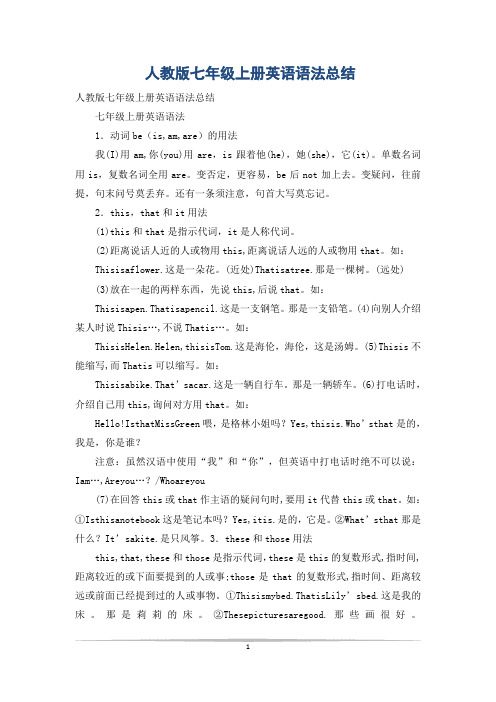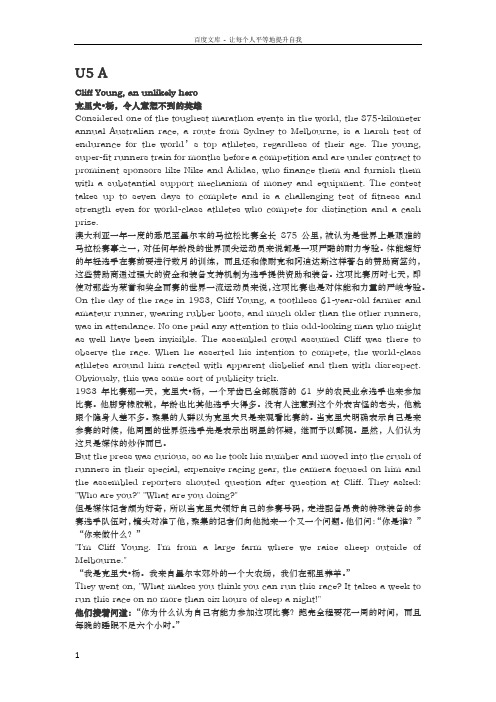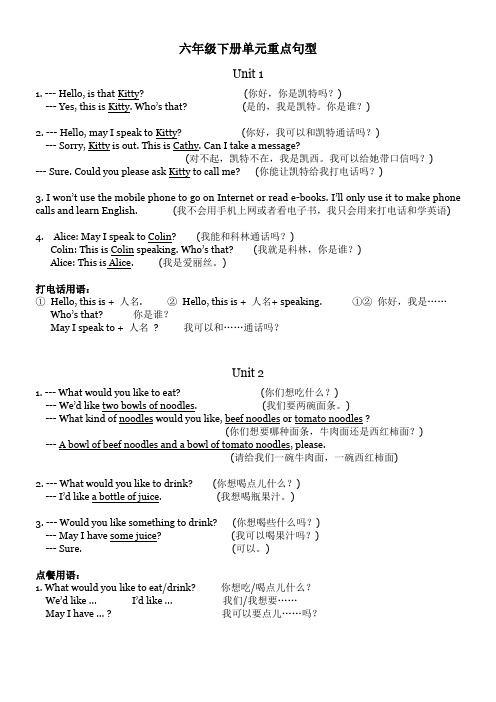你是谁英语是什么.doc
英语中的代词

英语中的代词英语中的代词英语作为一种广泛使用的语言,其中一个重要的语法范畴是代词。
代词在英语中起着重要的作用,它们在句子中代表了已经提到的人、物或事情。
这些代词通常用于简化句子结构,并使文本更加流畅。
在英语中,代词通常用于替代已经提到的事物,以避免重复。
它们可以替代名词、名词短语,甚至整个句子。
通过使用代词,我们可以更有效地传达我们的意思,同时使我们的文本不显得冗长。
英语中的代词有很多种,以下是一些主要的代词类型:1、人称代词:这是用来代替人的代词。
例如,我(I)、你(you)、他(he)、她(she)、它(it)、我们(we)、他们(they)。
2、指示代词:这些代词用于表示特定的对象。
例如,这个(this)、那个(that)、这些(these)、那些(those)。
3、疑问代词:这些代词用于提问中,用于询问人、物或事情。
例如,谁(who)、什么(what)、哪里(where)、何时(when)、怎样(how)。
4、关系代词:这些代词用于引导从句,并表示从句与主句之间的关系。
例如,谁(who)、什么(what)、哪里(where)、何时(when)、怎样(how)。
5、不定代词:这些代词用于表示不确定的或未知的人、物或事情。
例如,一个(a)、一些(some)、任何(any)、每个人(everyone)。
正确地使用代词可以帮助我们创建清晰、易于理解的文本。
也需要注意不要误用或错用代词,以免引起混淆或误解。
总的来说,英语中的代词是一个重要的语言工具,可以帮助我们更好地表达自己的意思。
小学英语语法代词小学英语语法代词:介绍、用法和注意事项在英语学习过程中,代词起着非常重要的作用。
尤其是对于小学生,掌握代词的用法能够更好地理解和运用英语。
本文将为大家介绍小学英语语法中的代词,包括其特点、用法和注意事项,以帮助孩子们更准确地使用英语。
一、代词的种类和特点在小学英语语法中,常见的代词有:人称代词、物主代词、反身代词、指示代词和不定代词等。
人教版七年级上册英语语法总结

人教版七年级上册英语语法总结人教版七年级上册英语语法总结七年级上册英语语法1.动词be(is,am,are)的用法我(I)用am,你(you)用are,is跟着他(he),她(she),它(it)。
单数名词用is,复数名词全用are。
变否定,更容易,be后not加上去。
变疑问,往前提,句末问号莫丢弃。
还有一条须注意,句首大写莫忘记。
2.this,that和it用法(1)this和that是指示代词,it是人称代词。
(2)距离说话人近的人或物用this,距离说话人远的人或物用that。
如:Thisisaflower.这是一朵花。
(近处)Thatisatree.那是一棵树。
(远处)(3)放在一起的两样东西,先说this,后说that。
如:Thisisapen.Thatisapencil.这是一支钢笔。
那是一支铅笔。
(4)向别人介绍某人时说Thisis…,不说Thatis…。
如:ThisisHelen.Helen,thisisTom.这是海伦,海伦,这是汤姆。
(5)Thisis不能缩写,而Thatis可以缩写。
如:Thisisabike.That’sacar.这是一辆自行车。
那是一辆轿车。
(6)打电话时,介绍自己用this,询问对方用that。
如:Hello!IsthatMissGreen喂,是格林小姐吗?Yes,thisis.Who’sthat是的,我是,你是谁?注意:虽然汉语中使用“我”和“你”,但英语中打电话时绝不可以说:Iam…,Areyou…?/Whoareyou(7)在回答this或that作主语的疑问句时,要用it代替this或that。
如:①Isthisanotebook这是笔记本吗?Yes,itis.是的,它是。
②What’sthat那是什么?It’sakite.是只风筝。
3.these和those用法this,that,these和those是指示代词,these是this的复数形式,指时间,距离较近的或下面要提到的人或事;those是that的复数形式,指时间、距离较远或前面已经提到过的人或事物。
新概念英语语法口诀

1、人称代词:人称代词有八个,我是I你是you,男他he,女她she,物它it,我们we,你们you,他们they;2、系动词的用法:系动词有三个,am,is,are;我用am,I am,你用are,you are;is连着他她它,he is ,she is, it is;我们你们和他们,两人以上全用are,we are,you are,they are;3、含有系动词的肯定句变一般疑问句规则:一般疑问句定义:能用yes或no来回答的问句;规则:肯定变疑问,句中含有am,is,are,I am变Are you,如遇my变成your,is are提到前,首字母要大写,句号变问号;4、一般疑问句的肯否回答:Be动词一般问,yes或no来回答,二变一,其他人称无变化,顺序颠倒就可以;Is he,he is,Is she,she is,Is it,it is,Are they,they are,否定回答添加not就可以;1、特殊疑问句:以特殊疑问词引导的问句叫特殊疑问句;构成:特殊疑问词+一般疑问句口诀:什么什么用what,年龄要用how old,who who你是谁,where where在哪里,whose谁的,how如何,which是问哪一个,when when问时间,what time几点了,how long问多长,how many ,how much问多少,how often问频率,what color问颜色,what class问班级,what grade问年级;特殊疑问句转变规则:1确定特殊疑问词;2除去划线部分剩余的变成一般疑问句:①直接变一般疑问句;②把划线部分后面的名词放在疑问词后面,其他变成一般疑问句;2、形容词性物主代词:my my是我的,your your是你的,his his男他的,her her女她的,its its物它的,our our我们的,your your你们的,their their他们的;3、人称代词与形容词性物主代词的区别:人称代词放句首,系词后面走,形物后面名词跟,两者细区分;4、名词所有格:一撇s所有格,s结尾只加,of所属无生命,各自所有都加,,多者共有,加后;5、第三人称单数have形式:have has表拥有,单三has,其他have;1、指示代词用法:指示代词作指示,this that要牢记,this指近处,these是复数,that指远处,those是复数,单变复,this变these,that变those,is变成are,a,an变个小尾巴,名词后面加;2、a,an的区别:a a an an表一个,a a用在辅音前,an an用在元音前;冠词用法:冠词记住定冠不定冠,不定冠词a和an,“一”的含义是泛指,表示特指使用the,方位次序最高级,世上事物独一个,人或事物再次谈,以下情况冠词免,学科球类三餐饭,节日星期月份前;3、第三人称单数形式:1除去你和我之外的所有人称的单数形式,都叫第三热完成单数形式,简称单三;2动词变单三形式规则:一般现在时,单三s/es,其他无变化,具体规则要牢记:①直接加s ②以s,x,ch,sh,o结尾+es ③辅+y,变y为i,+es ④特殊情况特殊记,have变has;1、情态动词用法:情态动词can表能会,后跟动原别忘记;Can提到前构成一般问,yes或no来回答,人称+can即可以,can后加not构成否定句;2、祈使句:定义:表示命令、建议、指令和劝告;1、名词单数变复数规则:名词单数变复数,一般规则要牢记;①直接+s ②以s,x,ch,sh结尾+es ③以o结尾,有生命+es,无生命+s 能活的有意思es不能活的只有死s④辅+y,变y为i再+es⑤以f,fe结尾,变f,fe为ves ⑥特殊情况特殊记;1、chant:颜色提问有三种,单数is,复数are,单物回答用it,s,复数回答用they are;eg:What colour is itWhat colour is your hatIt,s blue and yellow.What colour is the hat1、数字:1基数词,表数量,1到12记心上,13,14到19,用teen结尾记心头,20,30到90,ty结尾整数词,百位十位+and,一切都按单数看;2基数词,1到12整数记,13,14到19,后+teen,teen teen teen,20,30到90,后加ty别忘记,ty ty ty,个位到十位,中间连字符别忘记;十位到百位中间and别忘记;时间的表达:What time is it=What,s the timeOld wolf,old wolf,what time is it——It,s one.Old wolf,old wolf,what time is it——It,s two.…………Old wolf,old wolf,what time is it——It,s twelve.时间的表达方式:What time问几点,It,s回答记心间,回答方式有三点,直接数字回答最简单,整点回答o,clock加后边,第三种有点难,先分后点中间past to来连,半点前past连,半点后to来连,时间要用下一点,遇到半点用half,half past one;1、there be结构:什么地方有什么,there be,be动词,单数is复数are,there is,there are,be后加not构成否定句,be 提前构成一般疑问句一般疑问be提前,a a an an表一个,a a用在辅音前,an an用在元音前some any表一些,some用在陈述肯定句,否定疑问用any;(1)There is,there are某处有什么,There is a bird,叽叽喳喳喳,There are some ducks,嘎嘎嘎嘎嘎,There are some frogs,呱呱呱呱呱;(2)Is there,are there某处有什么,Is there a zoo有一个动物园吗Are there two lions有两只狮子吗Are there two bears有两只狗熊吗2、方位介词:可借助实物展示in in在里面,on on在上面,under under在下面,in front of在前面,behind behind在后面,near near在附近;how many,how much问多少,how many+可数名词复数,how much+不可数名词;how mang可数复,how much不可数不可数名词口诀:人名地名和国名,物质名词不可数:粉笔作业头发纸,牛奶果汁和酒水;1、情态动词用法:情态动词有三个,can may must,后加动原别忘记,can may表能会,征求对方的意见,May I开头较婉转,must表必须,否定回答needn,t,情态动词提前构成一般问,情态动词后+not构成否定句;2、电话用语:电话用语特殊记,要找某人May I speak to把头开,询问对方用that,Who,s that你是谁介绍自己用this,this is谁谁谁;现在进行时:动作正进行,现在进行时,系词加现在分词别少ing,别少系动词,两者句中缺,不是进行时;变疑问,系词提句首,变否定,not跟着系词走;另:现在进行时,动作正在进行中,主语+be现在分词,be+not构成否定句,一般疑问be提前;情态动词、助动词、系动词:肯定变疑问:有能有是怎么办,我搬能是到前面,无能无事怎么办,do和does句首站,肯定变否定:有能有是怎么办,not放在它后面,无能无事怎么办,don,t,doesn,t是关键;能是指所有情态动词1、星期几What day is it today几月几What,s the date today直接回答最简便,it,s回答更全面;2、要问最喜爱,what,s your favourate把头开,直接回答最可采,I like…best亦可代,My favourate…开头回答也应该,名词开头回答也无碍,以上回答可互代,任选一种拿过来;3、时间介词口诀:on in at表时间,on on用在具体某一天,in in表示月季年,用于“上午、下午和晚上”,at是个时间点,“工作”、“时刻”与“圣诞”;4、Monday Monday星期一,猴子花钱坐飞机,Tuesday Tuesday星期二,猴子屁股摔两半,Wednesday Wednesday星期三,猴子爬上花果山,Thursday Thursday,星期四,猴子去考试,Friday Friday星期五,猴子遇上大老虎,Saturday Saturday星期六,猴子上树摘石榴,Sunday Sunday星期天,猴子休息去公园;1、询问你职业,What do you do询问他她职业,does要把do来替,单数does,复数do,回答人称加be来帮助;2、重点句型Where are you from=Where do you come fromI am from… =I come from…Are you from… =do you come from…Yes,I am./No,I,m not. Yes,I do./No,I don,频率副词always 总是usually 通常often 常常sometimes有时never 从未1、要问最喜爱, What’s your favourite…把头开,直接回答最可采,I like…best. 亦可代,My favourite …开头回答也应该,名词开头回答也无碍,以上回答可互代,任选一种拿过来;would like 用于委婉的提出要求邀请或问题,后面加名词或to+动词原形. 意思相当于want sth. 或want to do sth.陈述句:I would like an ice cream.我想要一个冰淇淋;= I’d like an ice cream .否定句:I would not like an ice cream.我不想要冰淇淋一般疑问句:Would you like an ice cream.你想要个冰淇淋吗Yes,please./All right./,thanks.好的/行/好/不用了,谢谢.特殊疑问句:What would you like 你需要点什么形容词有三级:原级、比较级、最高级;原级词尾无变化;比较级+ er,最高级+ est,多音节词more/most放前面;两者之间比较级,三者或三者以上最高级;特殊情况要牢记:好、坏、多、少、远和老;•Good –better—best 一好•Bad—worse—worst一坏•Many\much—more—most一多•Little—less—least 一少•Far-fartherfurther—farthestfurthest一远•Old—olderelder—oldesteldest 一老1一般情况直接加er或est2 以e结尾的形容词只加r或st3辅加y结尾,变y为i再加er或est4重闭辅辅唯一,双写辅再加er或est一般将来时态:表示将要发生的动作或状态,常与表示将来的时间连用;结构:1.主语+will/shall第一人称用+动原2.主+be going to变否定will /shall/ be后加not变疑问will/shall/be 提前will not=won’t shall not=shan’t一般过去时:表示过去发生的动作或存在的状态;一般与yesterday, last night, last week, last year连用;结构:主语+动词过去式一般过去时动词的变化规则1. 直接加ed2.不发音e结尾加d3.辅+y变y为i加ed4.重闭辅唯一,双写辅加ed5.特殊情况特殊记一般过去主动宾要记清;规则词尾加ed,所有人称都能用;变疑问,did后面主语跟,谓语动词用原形;didn’t 否定其动词,注意动词用原形;。
你是谁作文大学英语

你是谁作文大学英语题目,Who Are You? (你是谁?)。
In this fast-paced world, each of us is constantly challenged to define who we are. It's a question that has intrigued philosophers, artists, and thinkers for centuries. And in the realm of personal introspection, the question "Who are you?" takes on even greater significance. As we navigate through life, we are confronted with various identities—some imposed upon us by society, others shaped by our experiences and choices. So, who am I? Who are you? Let's embark on a journey of self-discovery to unravel the complexities of our identities.First and foremost, our identities are often shaped by our roles in society. We are daughters, sons, siblings, friends, students, and professionals. These roles come with expectations, responsibilities, and obligations. As a daughter, I am expected to respect and care for my parents. As a student, I am expected to pursue knowledge and excelacademically. These societal roles not only define who we are but also influence our behavior and interactions with others.Moreover, our identities are deeply intertwined with our cultural and ethnic backgrounds. Growing up in a multicultural society, I have been exposed to diverse traditions, customs, and beliefs. These cultural influences have shaped my values, attitudes, and worldview. Whetherit's celebrating festivals with family or savoring traditional cuisines, my cultural identity is an integral part of who I am. Similarly, language plays a crucial role in shaping our identities. As a bilingual individual, I navigate between different linguistic worlds, each with its nuances and expressions.Furthermore, our identities are shaped by our experiences and personal narratives. From childhood memories to significant life events, our experiences shape the lens through which we perceive the world. For instance, overcoming challenges such as failure, loss, or adversity can strengthen our resilience and shape our identity.Similarly, moments of triumph and success can instill confidence and shape our self-perception. Our personal narratives, comprised of triumphs, setbacks, joys, and sorrows, weave the tapestry of our identities.Additionally, our identities are fluid and evolving. They are not static but rather dynamic constructs that evolve over time. As we journey through life, we encounter new experiences, forge new relationships, and undergo personal growth. These experiences broaden our perspectives, challenge our beliefs, and reshape our identities. Whatonce defined us may no longer hold true, as we continually redefine ourselves in light of new experiences and insights.Moreover, our identities are shaped by our aspirations, passions, and dreams. Whether it's pursuing a career path, engaging in creative endeavors, or advocating for causes we believe in, our aspirations reflect our values and priorities. Our passions fuel our pursuits and drive us to excel in our chosen endeavors. They give meaning andpurpose to our lives, shaping our identity in profound ways.In conclusion, the question "Who are you?" is a complex and multifaceted inquiry that defies simple answers. Our identities are shaped by a myriad of factors, including societal roles, cultural influences, personal experiences, and aspirations. They are fluid, dynamic, and continually evolving as we navigate through life's journey. Ultimately, our identity is a mosaic of our past, present, and future selves—a reflection of the unique individuals we are and aspire to be. So, who are you? Perhaps the answer lies in embracing the complexity of your identity and embarking on a journey of self-discovery to uncover the depths of your being.。
湘少版小学英语知识点汇总.doc

三年级上册一、问候1、——Hello!/Hi!你好! Km ....我是…2、-- What f SyOUr name?你叫什么名字?-- Km... / My name is ... 我是/我的名字是。
3、-- NiCe to meet you.见到你很高兴。
-- NiCe to meet you too!见到你也很高兴。
4、-- GOOd morning.早上好。
-- GOOd afternoon.下午好。
-- GOOd evening.晚上好。
-- Goodnight.晚安。
5、-- Goodbye!再见!-- Bye-bye!再见!二、谁?1、直接问-- WhO are you?你是谁?l,m・.・我是。
o o2、间接问-- Who is he/she?他/她是谁?——He/She is ... 他/她是。
-- WhO are they?他/她们是谁?-- They are ... 他/她们是。
三、选择疑问句(是不是?)①直接问-- Are you ...? 你是。
吗?-- Yes, I am. / No, Γm not.是,我是。
/ 不,我不是。
②间接问-- IS he/she ...?他/她是。
吗?-- Yes, he/she is. / No, he/she isn,t.是,他/她是。
/ 不,他/她不是。
-- Are they...?他/她们是… 吗?-- Yes, they are. / No, they aren,t.是,他们是。
/ 不,他们不是。
四、介绍(ThiSis・・・)①介绍家庭成员-- ThiS is my family.这是我的家庭。
②提问-- IS this your family? 这是你的家庭吗?-- Yes, it is. / No, it isn,t.是,它是。
/ 不,它不是。
五、问身份①直接问-- What,s he/she?他/她是什么?-- He/She is a fireman・他/她是消防员。
新视野大学英语第三版读写教程第二册Unit5翻译

U5 ACliff Young, an unlikely hero克里夫•杨,令人意想不到的英雄Considered one of the toughest marathon events in the world, the 875-kilometer annual Australian race, a route from Sydney to Melbourne, is a harsh test of endurance for the world’s top athletes, regardless of their age. The young, super-fit runners train for months before a competition and are under contract to prominent sponsors like Nike and Adidas, who finance them and furnish them with a substantial support mechanism of money and equipment. The contest takes up to seven days to complete and is a challenging test of fitness and strength even for world-class athletes who compete for distinction and a cash prize.澳大利亚一年一度的悉尼至墨尔本的马拉松比赛全长875 公里,被认为是世界上最艰难的马拉松赛事之一,对任何年龄段的世界顶尖运动员来说都是一项严酷的耐力考验。
体能超好的年轻选手在赛前要进行数月的训练,而且还和像耐克和阿迪达斯这样著名的赞助商签约,这些赞助商通过强大的资金和装备支持机制为选手提供资助和装备。
(原创)新陕旅版 六年级英语下册 单元重点句型总结

六年级下册单元重点句型Unit 11. --- Hello, is that Kitty? (你好,你是凯特吗?)--- Yes, this is Kitty. Who’s that?(是的,我是凯特。
你是谁?)2. --- Hello, may I speak to Kitty? (你好,我可以和凯特通话吗?)--- Sorry, Kitty is out. This is Cathy. Can I take a message?(对不起,凯特不在,我是凯西。
我可以给她带口信吗?)--- Sure. Could you please ask Kitty to call me? (你能让凯特给我打电话吗?)3. I won’t use the mobile phone to go on Internet or read e-books. I’ll only use it to make phone calls and learn English. (我不会用手机上网或者看电子书,我只会用来打电话和学英语)4. Alice: May I speak to Colin? (我能和科林通话吗?)Colin: This is Colin speaking. Who’s that? (我就是科林,你是谁?)Alice: This is Alice. (我是爱丽丝。
)打电话用语:①Hello, this is + 人名. ②Hello, this is + 人名+ speaking. ①②你好,我是……Who’s that? 你是谁?May I speak to + 人名? 我可以和……通话吗?Unit 21. --- What would you like to eat? (你们想吃什么?)--- We’d like two bowls of noodles. (我们要两碗面条。
)--- What kind of noodles would you like, beef noodles or tomato noodles ?(你们想要哪种面条,牛肉面还是西红柿面?)--- A bowl of beef noodles and a bowl of tomato noodles, please.(请给我们一碗牛肉面,一碗西红柿面)2. --- What would you like to drink? (你想喝点儿什么?)--- I’d like a bottle of juice. (我想喝瓶果汁。
小王子英语介绍

第二天,小王子又来了。 The next day the little prince came back.
“你要能在每天同一个时间来就更好了。”狐狸说道,“比如说你在下午四点来,从三点开始,我就开始感觉很快乐,时间越 临近,我就越来越感到快乐。到了四点钟的时候,我就会坐立不安,我发现了幸福的价值。但是,如果你随便什么时候来,我 就不知道在什么时候该准备好我的心情。” "It would have been better to come back at the same hour," said the fox. "If, for example, you come at four o'clock in the afternoon, then at three o'clock I shall begin to be happy. I shall feel happier and happier as the hour advances. At four o'clock, I shall already be worrying and jumping about. I shall show you how happy I am! But if you come at just any time, I shall never know at what hour my heart is to be ready to gr找人。”小王子说,“什么叫‘驯服’呢?”
"I am looking for men," said the little prince. "What does that mean-- 'tame'?"
“这是已经早就被人遗忘了的事情,”狐狸说,“它的意思就是‘建立联系’ "It is an act too often neglected," said the fox. It means to establish ties."
- 1、下载文档前请自行甄别文档内容的完整性,平台不提供额外的编辑、内容补充、找答案等附加服务。
- 2、"仅部分预览"的文档,不可在线预览部分如存在完整性等问题,可反馈申请退款(可完整预览的文档不适用该条件!)。
- 3、如文档侵犯您的权益,请联系客服反馈,我们会尽快为您处理(人工客服工作时间:9:00-18:30)。
你是谁英语是什么
你是谁英语是什么
Who are you
你是谁的英语例句
1. Remember, happiness doesn t depend upon who you are or what you have; it depends solely upon what you think.--Dale Carnegie
请记住,幸福不在于你是谁或者你拥有什么,而仅仅取决于你的心态!
2. Who are you? he enquired of the first man.
你是谁? 他问第一个人。
3. Who are you and whither are you bound?
你是谁?要去哪里?
4. Who are you? the man exclaimed furiously.
你是谁? 那男人大怒地叫道.
5. Hello, who s speaking , please?
喂, 请问你是谁呀?
6. All right, who are you and what are you doing in my office?
喂,你是谁,在我的办公室做什么?
7. Did he know who you are? I think so. I think the penny dropped.
他知道你是谁吗? 我想是的。
我觉得他是突然想到的。
8. Papa is a blacksmith. But who are you?
爸爸是做铁匠的, 你是谁?
9. This is Joan speaking . Who s that, please?
我是琼. 请问你是谁?
10. If you were asked who shot Lee Harvey Oswald you would probably say Jack Ruby.
如果有人问你是谁开枪打死了李哈维奥斯瓦尔德,你多半会回答说是杰克鲁比.
11. Main Idea: typefaces is used to bravely express who you are.
核心创意: 用锻造字体斗胆地喊出你是谁!
12. Oh, whoever you may be, do you not remember?
无论你是谁, 你总忘不了吧!
13. Geese: Who are you? You re an ugly duckling. Well, we re leaving. Good - bye !
鹅: 你是谁? 你是一只丑鸭子. 好了, 我们要走了. 再见!
14. Who do you think you are, you really have a big head.
你以为你是谁, 你真的很自负.
15. So: You have to find out who you are and be that.
所以: 你要找到你是谁,做好自己.
Who are的双语例句
1. You can chat to other people who are online.
你可以和其他在线的人聊天。
2. It is nearly always women who are the primary care givers.
从事初级保健护理工作的几乎都是女性。
3. The kids who are joyriding and ram-raiding are unemployed.
那些开偷来的车狂飙和驾车抢劫的年轻人都是无业游民。
4. We look for applicants who are numerate, computer-literate and energetic self-starters.
我们对求职者的要求是具备运算能力,熟练使用电脑,精力充沛而且工作积极主动。
5. Who are you? he enquired of the first man.
你是谁? 他问第一个人。
6. These are the people who are doing our loft conversion for us.
就是这些人在为我们改造阁楼。
7. Pregnant women who are heavy drinkers risk damaging the unborn foetus.
孕妇酗酒可能会危及腹中胎儿。
8. Police said they suspected that Sobhraj had accomplices who are drug smugglers.
警方说他们怀疑索布拉还有一些走私毒品的同伙.
9. The hijacker gave himself up to police, who are now questioning him.
劫持者向警方自首了,目前警方正在审讯他。
10. It s the small fry who are usually the last to get paid.
小人物往往是最后才拿到酬金。
11. People who are drug addicts come in and steal.
瘾君子会进来偷东西。
12. We have all wished for men who are more considerate.
我们都曾祈求能找到更加体贴的男人。
13. Every day the newspapers tell stories of children worldwide who are abused.
每天报纸都在讲述世界各地受虐儿童的故事。
14. A job placement program exists to help those who are unemployed.
就业安置计划是为了帮助那些失业者。
15. It s great to work with people who are on the same wavelength.
与志同道合的人一起工作真是太棒了。
